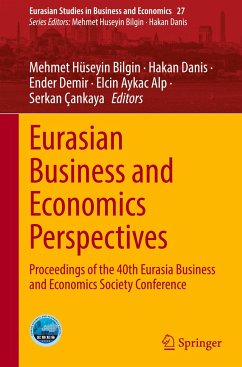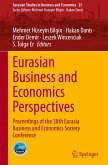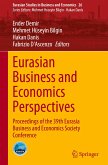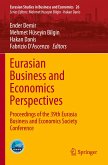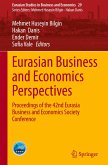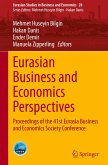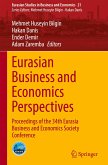Eurasian Business and Economics Perspectives
Proceedings of the 40th Eurasia Business and Economics Society Conference
Herausgegeben:Bilgin, Mehmet Hüseyin; Danis, Hakan; Demir, Ender; Aykac Alp, Elcin; Çankaya, Serkan
Eurasian Business and Economics Perspectives
Proceedings of the 40th Eurasia Business and Economics Society Conference
Herausgegeben:Bilgin, Mehmet Hüseyin; Danis, Hakan; Demir, Ender; Aykac Alp, Elcin; Çankaya, Serkan
- Gebundenes Buch
- Merkliste
- Auf die Merkliste
- Bewerten Bewerten
- Teilen
- Produkt teilen
- Produkterinnerung
- Produkterinnerung
EBES conferences have been an intellectual hub for academic discussion in economics, finance, and business fields and provide network opportunities for participants to make long-lasting academic cooperation. This is the 27th volume of the Eurasian Studies in Business and Economics (EBES's official proceeding series), which includes selected papers from the 40th EBES Conference which took place in Istanbul on July 6-8, 2022. The conference was organized with the support of the Istanbul Economic Research Association in hybrid mode with both online and in-person discussions at the Istanbul…mehr
Andere Kunden interessierten sich auch für
![Eurasian Business and Economics Perspectives Eurasian Business and Economics Perspectives]() Eurasian Business and Economics Perspectives171,99 €
Eurasian Business and Economics Perspectives171,99 €![Eurasian Business and Economics Perspectives Eurasian Business and Economics Perspectives]() Eurasian Business and Economics Perspectives171,99 €
Eurasian Business and Economics Perspectives171,99 €![Eurasian Business and Economics Perspectives Eurasian Business and Economics Perspectives]() Eurasian Business and Economics Perspectives171,99 €
Eurasian Business and Economics Perspectives171,99 €![Eurasian Business and Economics Perspectives Eurasian Business and Economics Perspectives]() Eurasian Business and Economics Perspectives171,99 €
Eurasian Business and Economics Perspectives171,99 €![Eurasian Business and Economics Perspectives Eurasian Business and Economics Perspectives]() Eurasian Business and Economics Perspectives164,99 €
Eurasian Business and Economics Perspectives164,99 €![Eurasian Business and Economics Perspectives Eurasian Business and Economics Perspectives]() Eurasian Business and Economics Perspectives149,99 €
Eurasian Business and Economics Perspectives149,99 €![Eurasian Business and Economics Perspectives Eurasian Business and Economics Perspectives]() Eurasian Business and Economics Perspectives134,99 €
Eurasian Business and Economics Perspectives134,99 €-
-
-
EBES conferences have been an intellectual hub for academic discussion in economics, finance, and business fields and provide network opportunities for participants to make long-lasting academic cooperation. This is the 27th volume of the Eurasian Studies in Business and Economics (EBES's official proceeding series), which includes selected papers from the 40th EBES Conference which took place in Istanbul on July 6-8, 2022. The conference was organized with the support of the Istanbul Economic Research Association in hybrid mode with both online and in-person discussions at the Istanbul Ticaret University in Istanbul, Türkiye. Both theoretical and empirical papers in this volume cover diverse areas of business, economics, and finance from many different regions.
Produktdetails
- Produktdetails
- Eurasian Studies in Business and Economics 27
- Verlag: Springer / Springer Nature Switzerland / Springer, Berlin
- Artikelnr. des Verlages: 978-3-031-51211-7
- 2024
- Seitenzahl: 648
- Erscheinungstermin: 3. Juli 2024
- Englisch
- Abmessung: 241mm x 160mm x 41mm
- Gewicht: 1070g
- ISBN-13: 9783031512117
- ISBN-10: 3031512111
- Artikelnr.: 69496016
- Herstellerkennzeichnung Die Herstellerinformationen sind derzeit nicht verfügbar.
- Eurasian Studies in Business and Economics 27
- Verlag: Springer / Springer Nature Switzerland / Springer, Berlin
- Artikelnr. des Verlages: 978-3-031-51211-7
- 2024
- Seitenzahl: 648
- Erscheinungstermin: 3. Juli 2024
- Englisch
- Abmessung: 241mm x 160mm x 41mm
- Gewicht: 1070g
- ISBN-13: 9783031512117
- ISBN-10: 3031512111
- Artikelnr.: 69496016
- Herstellerkennzeichnung Die Herstellerinformationen sind derzeit nicht verfügbar.
Dr. Hakan Danis is the Director in Economic Scenarios and OpRisk Modeling at MUFG (USA). Prior to this position, he worked at the Spanish multinational global bank Banco Bilbao Vizcaya Argentaria (BBVA) in USA as Senior Economist. He is one of the founders and first President of EBES. He also worked at Kadir Has University (Turkey) as research assistant. He has published articles in many of the leading economics and finance journals and currently serves as the Managing Editor of Eurasian Economic Review (a Springer Journal) which is indexed in SCOPUS. He was guest editor at Emerging Markets Finance & Trade (EMFT) (SSCI) and Singapore Economic Review (SER) (SSCI) multiple times and published several academic books. His current research and teaching interests include monetary policy, nonlinear applied time series, risk management in financial institutions and macroeconomics. He holds a PhD in Economics from University of Georgia (USA), M.A. and B.A. in Economics from Marmara University (Turkey). Prof. Serkan Çankaya is a Professor of Banking & Finance at Istanbul Ticaret University and has been the head of the Department of Finance & Banking since 2021. He received an MBA in Finance from the University of West Georgia and a Ph.D. in Banking and Finance from Kadir Has University, where he held an administrative and research position at the Graduate School of Social Sciences. He also held visiting faculty position in University of Washington. He has published in several peer-reviewed international journals such as Borsa Istanbul Review and Applied Economics. His current research interests include behavioral finance and sustainable finance. Assc. Prof. Ender Demir is an Associate Professor of finance at the Department of Business Administration, School of Social Sciences in Reykjavik University, Iceland. Dr. Demir has received his Ph.D. in Business from Ca Foscari University, Italy. He spent 6 months as a visiting Ph.D. student at Tel Aviv University, Israel. He has been teaching at Istanbul Medeniyet University, Yeditepe University (part-time) and Istanbul Bilgi University (part-time). Dr. Demir is the conference coordinator of Eurasia Business and Economic Society (EBES). He serves as the associate editor at Eurasian Business Review (SSCI) and as a subject editor at Journal of Multinational Financial Management (SSCI). He has published his research in peer-reviewed international journals, including Journal of Financial Stability, Emerging Markets Review, Finance Research Letters, and Journal of International Financial Markets, Institutions & Money, and Tourism Management. His research interest are corporate finance, Cryptocurrencies, financial economics, and tourism economics. Prof. Dr. Mehmet Huseyin Bilgin graduated from the Department of Labor Economics at the Faculty of Economics at Istanbul University (1994) where he also earned an M.A. degree in Labor Economics (1996). Professor Bilgin received his Ph.D. from the Department of Economics at Abant Izzet Baysal University in 2000. After spent 3 years as Research Assistant at the Department of Economics at Abant Izzet Banysal University, he joined Kadir Has University as an assistant professor in 2000. In 2005, he started serving as an associate professor in macroeconomics and became a full professor at the Department of International Economic Integration at Istanbul Medeniyet University in 2011. He taught at Kadir Has University between 2000-2011 and served as the head of the Department of International Finance at the same university during 2009-2011. Since 2011, he has been teaching at Faculty of Political Sciences at Istanbul Medeniyet University and served as a part-time professor at Yeditepe University between 2011-2014. Professor Bilgin has many articles published in reputed international journals indexed by scientific databases and research papers presented at international conferences as well as published academic books, plenty of articles both published and presented at the conferences on a national scale. He is the founder of Istanbul Economic Research Association and currently serves as the Chairman. He is also the founder of an international scholarly association called EBES (Eurasia Business and Economics Society) and currently serves as the Vice President. He has also been active as a consultant in several institutions, a newspaper columnist, and featured in several television programs. Prof. Elcin Aykac Alp is a Professor at Istanbul Ticaret University (Turkey). She has Bachelor's and Master's degree in Econometrics from Marmara University. She received a Ph.D. in Economics from Y¿ld¿z Technical University. Her current research and teaching interests cover topics in the field of applied econometrics, financial econometrics and non-linear time series analysis. She is Director of Economics and Finance Research and Application Center since 2014 at Istanbul Ticaret University.The center carried out projects with many institutions and universities. She has published articles in journals like Applied Economics, Quality & Quantity, The Journal of Energy and Development, Expert Systems with Applications, Applied Econometrics and International Development, International Journal of Applied Econometrics and Quantitative Studies.
The influence of ESG factors on the companies performance in developed and emerging markets.- Linking corporate social responsibility, innovation and company performance: a theoretical investigation.- Employees' opportunism and firm performance: evidence from Russian corporations.- Optimising decision-making: devising a framework applicable to project management practitioners.- The dual role of the manager as an employee and as a representative of the organization in shaping the psychological contract.- The roles of transformational leadership, perceived organizational support, digital capability towards employees' adaptability and readiness for digital transformation.- The role of organizational capabilities towards firm performance in disruptive environment.- Service sector high-growth firms in the covid-19 pandemic: Russian case.- Choosing environmentally friendly transportation in the post-covid-19 era: the role of personal moral norms.- The relationships of design thinking, customer experience, customer satisfaction, customer loyalty and word of mouth.- The relationships of marketing mix strategy and product innovation on firm reputation, brand equity & competitive advantage.- What SMEs should be supported to increase the number of exporting SMEs?.- How leaders deal with changes from the external environment in developing country: evidence from Indonesia.- Knowing the state of the art of the application of technology in tourism: a bibliometric analysis.- The role of public trust in fostering residents' support for tourism development: evidence from a Portuguese historic town.- Public sector reporting in the times of crisis and pandemics - some evidence from New Zealand on reporting in covid-19 environment.- Barriers to artificial intelligence in accounting implementation in Oman.- The outsourced facility service industry - a profitable industry?.- Revisiting riba & gharar in light of a contemporary analysis of their Shariah objectives.- Silver generation, digitalization, cashless payment and the phenomenon of social and financial exclusion in the era of Covid-19.- Revealing major factors of digital banking adoption: a literature survey.- Postgraduate research culture: providing a positive learning environment and experience.- Early childhood human capital investment and early child outcomes.- Optimal allocation for actuarial liabilities: an insurance industry application.- The economic causes for the protest actions in Kazakhstan.- The effects of remittances on economic growth through institutional quality in the European Union member states.- Corporate reputation, information asymmetry, and performance: an analysis of international container ports.- Landscape of robo- advisory industry challenges & prospects: the case of wahed invest.- Macroprudential policies and volatility of investments.- The ascent of robo-advisory: scientometrics analysis and prospects for robo-advisory research.- Islamic banking and their responses to the newwave of digital disruption in the gulf countries.- M&a of conventional and Islamic banks: a bibliometric review.- Analysis of the progress of sustainable development in the European Union.- Impact of data analytics in agriculture: landscape approach for sustainable land use
The influence of ESG factors on the companies performance in developed and emerging markets.- Linking corporate social responsibility, innovation and company performance: a theoretical investigation.- Employees' opportunism and firm performance: evidence from Russian corporations.- Optimising decision-making: devising a framework applicable to project management practitioners.- The dual role of the manager as an employee and as a representative of the organization in shaping the psychological contract.- The roles of transformational leadership, perceived organizational support, digital capability towards employees' adaptability and readiness for digital transformation.- The role of organizational capabilities towards firm performance in disruptive environment.- Service sector high-growth firms in the covid-19 pandemic: Russian case.- Choosing environmentally friendly transportation in the post-covid-19 era: the role of personal moral norms.- The relationships of design thinking, customer experience, customer satisfaction, customer loyalty and word of mouth.- The relationships of marketing mix strategy and product innovation on firm reputation, brand equity & competitive advantage.- What SMEs should be supported to increase the number of exporting SMEs?.- How leaders deal with changes from the external environment in developing country: evidence from Indonesia.- Knowing the state of the art of the application of technology in tourism: a bibliometric analysis.- The role of public trust in fostering residents' support for tourism development: evidence from a Portuguese historic town.- Public sector reporting in the times of crisis and pandemics - some evidence from New Zealand on reporting in covid-19 environment.- Barriers to artificial intelligence in accounting implementation in Oman.- The outsourced facility service industry - a profitable industry?.- Revisiting riba & gharar in light of a contemporary analysis of their Shariah objectives.- Silver generation, digitalization, cashless payment and the phenomenon of social and financial exclusion in the era of Covid-19.- Revealing major factors of digital banking adoption: a literature survey.- Postgraduate research culture: providing a positive learning environment and experience.- Early childhood human capital investment and early child outcomes.- Optimal allocation for actuarial liabilities: an insurance industry application.- The economic causes for the protest actions in Kazakhstan.- The effects of remittances on economic growth through institutional quality in the European Union member states.- Corporate reputation, information asymmetry, and performance: an analysis of international container ports.- Landscape of robo- advisory industry challenges & prospects: the case of wahed invest.- Macroprudential policies and volatility of investments.- The ascent of robo-advisory: scientometrics analysis and prospects for robo-advisory research.- Islamic banking and their responses to the newwave of digital disruption in the gulf countries.- M&a of conventional and Islamic banks: a bibliometric review.- Analysis of the progress of sustainable development in the European Union.- Impact of data analytics in agriculture: landscape approach for sustainable land use

